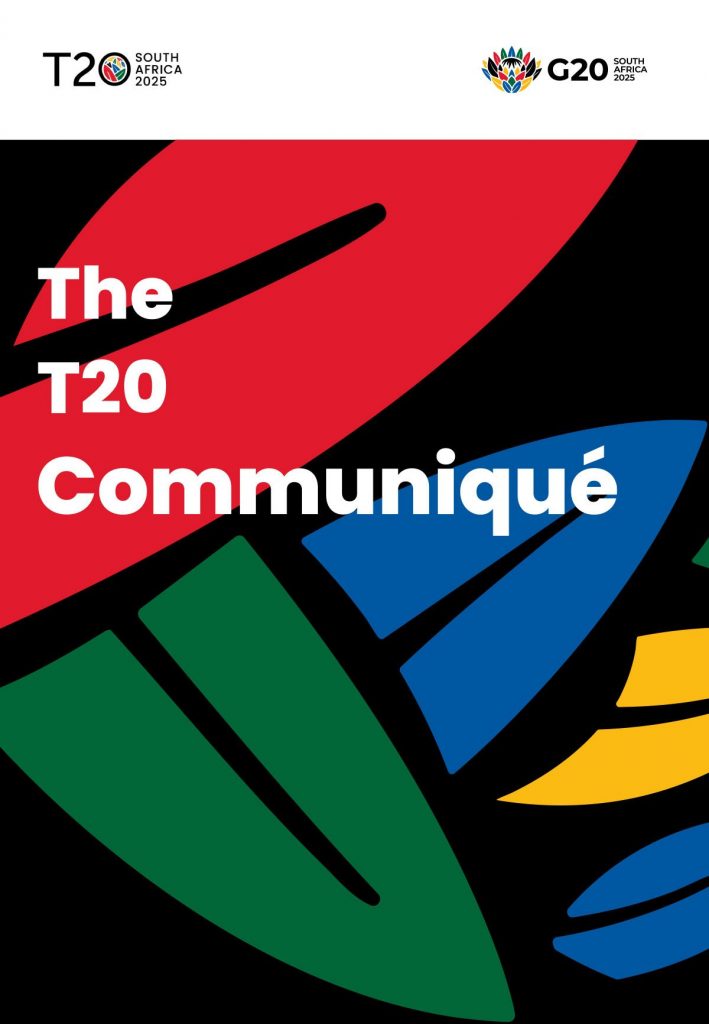The T20
The Think 20 (T20) is an official engagement group of the G20 and is an established network of research institutes, think tanks and eminent academics from G20 member countries and further afield working on G20-related themes and processes.
History of the T20
Created in 2012 during the Mexican Presidency of the G20, the T20 endeavours to add value to G20 processes by providing evidence-based analysis and targeted policy recommendations linked to the thematic areas covered by the G20 agenda.
South Africa’s T20 focuses on five thematic taskforces, namely (1) trade and investment; (2) digital transformation; (3) international financial architecture reform; (4) solidarity and SDGs; and (5) climate action and just energy transition. This focus is closely aligned with South Africa’s G20 priorities, namely strengthening disaster resilience and response, debt sustainability for low-income countries, mobilisation of finance for a just energy transition, and harnessing critical minerals for inclusive growth and sustainable development. The T20 produces detailed recommendations under the G20’s broader thematic areas in the form of policy briefs that seek to inform the final G20 Summit declaration that emerges at the end of each presidency.
Members of the T20 have a three-fold role. They engage closely with the leaders of the sherpa and finance tracks throughout each country presidency on the framing of the G20 agenda, supporting idea generation and intellectual input into the G20 agenda. The T20 also facilitates interactions among its members, the international policy community and the broader public on global governance challenges. Finally, the analytical depth provided by leading experts from the T20 also supports the G20 to formulate and deliver evidence-based, sustainable policies.
Over the years, African issues have gradually been integrated into the thematic taskforces of the G20, replacing the ‘Cooperation with Africa’ task force (2017–2019), which sought to ensure that African concerns were included in all the workstreams and policy areas of the G20 agenda. Instead, research from the T20 taskforces sought to reinforce the commitment of G20 member states to Africa’s Agenda 2063, as well as the Sustainable Development Goals (SDGs). In doing so, they explored various options in which sustainable development could be promoted across the African continent by tackling policy issues relating to fiscal and debt sustainability, industrial development, taxation, food security and governance, among others.
SAIIA’s engagement with the T20 has been in-depth and ongoing. SAIIA’s chief executive has co-chaired various task forces on the SDGs and development during the Saudi Arabian (2020), Italian (2021) and Indian (2023) presidencies. During the German (2017), Argentine (2018) and Japanese (2019) G20 presidencies, SAIIA co-chaired the ‘Cooperation with Africa’ task force and established, with the German Institute of Development and Sustainability (IDOS), the T20 Africa Standing Group under the 2017 German G20 Presidency. SAIIA’s chief executive was a member of the International Advisory Board of the Brazilian T20 and had a responsibility in this role to raise awareness in South Africa of the role of the T20 and the G20 among the knowledge community, as well as on the key themes and issues advanced by the Brazilian G20 Presidency and the T20. Under the South African G20 presidency, SAIIA, along with the Institute for Global Dialogue and the Institute for Pan African Thought and Conversation, are tasked with coordinating the South African T20 process.
With the admission of the AU to the G20, the African knowledge community has a responsibility to contribute substantively to ensuring Africa’s priorities are on the global economic governance and development agenda. Providing technical support and thought leadership will be integral to driving African solutions to global issues, as G20 policies often have a far-reaching impact on African economies and policymaking.
T20 Communiqué
The T20 South Africa officially presented its Communiqué on 26 June 2025 at the 3rd G20 Sherpa Meeting.
The Communiqué offers a set of high-impact, solutions-driven and implementation-focused policy recommendations that are intended to help shape the G20 Leaders’ Declaration. It is the culmination of extensive collaborative work, synthesising vital insights and proposals from the five T20 Task Forces. The document builds upon robust discussions held at key events, including the T20 Midterm Conference, the T20 Africa High-Level Policy Dialogue, the Inception Conference and other significant engagements throughout the T20 South Africa cycle.

The T20 Communiqué delivers high-impact, solutions-driven, and implementation-focused policy recommendations to the G20. This essential document draws on the collective expertise of the T20's five Task Forces, covering crucial areas: Trade and Investment, Digital Transformation, Financing for Sustainable Development, Solidarity for the Achievement of the SDGs and Accelerating Climate Action and the Just Energy Transition.
Task Forces
The Communiqué offers recommendations from the five T20 task forces
